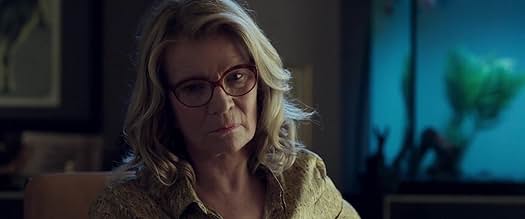CALIFICACIÓN DE IMDb
6.8/10
8.1 k
TU CALIFICACIÓN
Claire, una profesora divorciada de 50 años, crea un perfil de Facebook fingiendo ser una joven de 24.Claire, una profesora divorciada de 50 años, crea un perfil de Facebook fingiendo ser una joven de 24.Claire, una profesora divorciada de 50 años, crea un perfil de Facebook fingiendo ser una joven de 24.
- Dirección
- Guionistas
- Elenco
- Premios
- 1 premio ganado en total
Opiniones destacadas
I was expecting another movie about social media but not. More about getting old and relationships in the technology era. Great Juliette like always. And you will never gues what will happen at the end.
In Saffy Nabbou's film 'Who You Think I Am', a woman impersonates a much younger person to woo a man on the internet. She does the job so well they become emotionally close without meeting; but of course, no meeting will ever be possible. Juliette Binoche is pretty good as the lead but the script lets her down. The film mainly works through the clumsy device of having its protagonist talking to a therapist, though at one stage, we're expected to follow an alternative working out of the story that she has imagined as a piece of fiction. The tale ends with a couple of twists in quick succession; at least one of them might have been better revealed upfront, so we understood the character's motivation better.
At the outset, this film may seem like a slow, perhaps heavily cerebral drama without a wide appeal. However, dig a little deeper, and you'll discover that Who You Think I Am is actually a thrilling, sleek and deeply enthralling watch.
With a dynamite lead performance from Juliette Binoche and arresting direction from Safy Nebbou, it's a slow-burn thriller that you really won't want to take your eyes away from, as it continues to surprise with regular twists and consistently thought-provoking themes.
The overall premise is simple. Who You Think I Am plays out as a romantic drama between Juliette Binoche, who pretends to be a younger woman online, and François Civil, who we almost only hear by voice and see by text message.
The story therefore looks at the practice known as 'catfishing' (pretending to be someone else online). However, rather than simply looking at the morality of the practice - which is a fairly straightforward debate - Who You Think I Am is a film that takes a really wide perspective, and seeks to understand and discuss a lot more about how this kind of situation comes about.
As a result, though the inevitably doomed online relationship is agonising to watch unfold, the film's most interesting suit is its perspective on female emancipation and liberation - using Binoche's middle-aged character as an example of how women are pigeonholed into roles to conform with by the pressures of society.
In portraying her character's desire to break out of that role, Binoche gives a powerful performance that blends an inspiring and passionate show of female independence with a striking sense of unhinged obsession. As a result, while you certainly sympathise with her character and her motivations throughout the story, that tinge of darker, obsessive personality makes her an ambiguous and often unpredictable lead throughout the film.
And that's where Who You Think I Am is really able to stretch its legs as an all-out thriller. It certainly doesn't have the pacing to be considered your average thrill ride - playing out at a very patient tempo with intimate dialogue scenes the central focus - but there's a bubbling air of cagey tension that grows and grows throughout, which makes the film a captivating watch right to the finish.
Director Safy Nebbou does a brilliant job at injecting that tension and dramatic eeriness into the mix throughout. He's able to make sure the film retains its slow, pensive atmosphere (which allows its dramatic themes to really come out), but also creates genuine excitement with a sleek, modern visual style and a powerfully tense aura in every scene through the film.
The film is at its best in the second act - where tension and thought-provoking dramatic depth work hand in hand. Meanwhile, the third act brings some shocking twists to the table, taking the story in an unexpected direction towards the finish - although it's fair to say the screenplay piles on a few too many twists in the closing stages, bringing things to a slightly more convoluted end than perhaps necessary.
Saying that, I was really impressed by Who You Think I Am. A gripping drama that works just as well as an unnerving and exciting thriller, it's a sleek, stylish film that's full of riveting and thought-provoking dramatic depth. The lead performance from Juliette Binoche is excellent, and director Safy Nebbou does well to balance the film's numerous different styles and ideas throughout.
With a dynamite lead performance from Juliette Binoche and arresting direction from Safy Nebbou, it's a slow-burn thriller that you really won't want to take your eyes away from, as it continues to surprise with regular twists and consistently thought-provoking themes.
The overall premise is simple. Who You Think I Am plays out as a romantic drama between Juliette Binoche, who pretends to be a younger woman online, and François Civil, who we almost only hear by voice and see by text message.
The story therefore looks at the practice known as 'catfishing' (pretending to be someone else online). However, rather than simply looking at the morality of the practice - which is a fairly straightforward debate - Who You Think I Am is a film that takes a really wide perspective, and seeks to understand and discuss a lot more about how this kind of situation comes about.
As a result, though the inevitably doomed online relationship is agonising to watch unfold, the film's most interesting suit is its perspective on female emancipation and liberation - using Binoche's middle-aged character as an example of how women are pigeonholed into roles to conform with by the pressures of society.
In portraying her character's desire to break out of that role, Binoche gives a powerful performance that blends an inspiring and passionate show of female independence with a striking sense of unhinged obsession. As a result, while you certainly sympathise with her character and her motivations throughout the story, that tinge of darker, obsessive personality makes her an ambiguous and often unpredictable lead throughout the film.
And that's where Who You Think I Am is really able to stretch its legs as an all-out thriller. It certainly doesn't have the pacing to be considered your average thrill ride - playing out at a very patient tempo with intimate dialogue scenes the central focus - but there's a bubbling air of cagey tension that grows and grows throughout, which makes the film a captivating watch right to the finish.
Director Safy Nebbou does a brilliant job at injecting that tension and dramatic eeriness into the mix throughout. He's able to make sure the film retains its slow, pensive atmosphere (which allows its dramatic themes to really come out), but also creates genuine excitement with a sleek, modern visual style and a powerfully tense aura in every scene through the film.
The film is at its best in the second act - where tension and thought-provoking dramatic depth work hand in hand. Meanwhile, the third act brings some shocking twists to the table, taking the story in an unexpected direction towards the finish - although it's fair to say the screenplay piles on a few too many twists in the closing stages, bringing things to a slightly more convoluted end than perhaps necessary.
Saying that, I was really impressed by Who You Think I Am. A gripping drama that works just as well as an unnerving and exciting thriller, it's a sleek, stylish film that's full of riveting and thought-provoking dramatic depth. The lead performance from Juliette Binoche is excellent, and director Safy Nebbou does well to balance the film's numerous different styles and ideas throughout.
This film pushes at the limits of what film can do in the sense that most interesting things in it are not what are shown but what the writer can express about the inner life of the character and other non-narrative aspects.
Cinema must show through the lens; it is a complete image. Text is borderless, frameless, it can be objective, or as abstract as is necessary. This is why every film version of "Madame Bovary" is a disappointment because Flaubert never tells the reader what Emma looks like but every actress is an incarnation of Emma.
In terms of this film, when the story progresses in its first half, it work rather well; perhaps a bit slow for some minds, but the characterization and the dilemma are intriguing and contemporary. The camera is fluid and Binoche appeals in her restrained and deceptive role.
The reflection on technology, social media, and how it has changed the way humans see themselves and their relationships is typical, and while the psychological exploration of its effect is engaging, it may border on the slightly too subtle.
Where the film loses some momentum is in the second half which ties the elements together. As a novel the story and the inner narrative would be better presented. That is not a fault of the screenplay, rather it is the possibilities of the medium.
The performances make this worth watching and the depiction of contemporary relationships is another part of the discussion on how society is changing.
Cinema must show through the lens; it is a complete image. Text is borderless, frameless, it can be objective, or as abstract as is necessary. This is why every film version of "Madame Bovary" is a disappointment because Flaubert never tells the reader what Emma looks like but every actress is an incarnation of Emma.
In terms of this film, when the story progresses in its first half, it work rather well; perhaps a bit slow for some minds, but the characterization and the dilemma are intriguing and contemporary. The camera is fluid and Binoche appeals in her restrained and deceptive role.
The reflection on technology, social media, and how it has changed the way humans see themselves and their relationships is typical, and while the psychological exploration of its effect is engaging, it may border on the slightly too subtle.
Where the film loses some momentum is in the second half which ties the elements together. As a novel the story and the inner narrative would be better presented. That is not a fault of the screenplay, rather it is the possibilities of the medium.
The performances make this worth watching and the depiction of contemporary relationships is another part of the discussion on how society is changing.
Juliette binoche makes even a role like this brighter than it could have been. The mood and tone of the film take you into your own loneliness and make you wonder what all one could or be compelled to do, because one is lonely. There's a line in it 'i dont mind dying. I just don't want to be abandoned.'. Lovely line. Watch it for binoche.
¿Sabías que…?
- TriviaIn this film. actors Juliet Binoche and Francois Civil play lovers. In the film, Elles (2011). they play Mother and Son. Ms Binoche jokes about this in the DVD extras about the making of the film.
- Citas
Claire Millaud: I do use social media, dr. Bormans. For people like me it's both, a shipwreck and a life raft.
- ConexionesReferences Relaciones peligrosas (1988)
Selecciones populares
Inicia sesión para calificar y agrega a la lista de videos para obtener recomendaciones personalizadas
- How long is Who You Think I Am?Con tecnología de Alexa
Detalles
- Fecha de lanzamiento
- Países de origen
- Sitios oficiales
- Idioma
- También se conoce como
- Who You Think I Am
- Locaciones de filmación
- Productoras
- Ver más créditos de la compañía en IMDbPro
Taquilla
- Total en EE. UU. y Canadá
- USD 45,265
- Fin de semana de estreno en EE. UU. y Canadá
- USD 11,223
- 5 sep 2021
- Total a nivel mundial
- USD 3,258,051
- Tiempo de ejecución1 hora 41 minutos
- Color
- Relación de aspecto
- 2.35 : 1
Contribuir a esta página
Sugiere una edición o agrega el contenido que falta

Principales brechas de datos
By what name was No soy quien crees (2019) officially released in India in English?
Responda
![Ver Bande-annonce [OV]](https://m.media-amazon.com/images/M/MV5BNDc5ZmE5NTEtYzJiYy00ZmNjLWI3YjktMTE3YWVhZDU0MGQ0XkEyXkFqcGdeQXRodW1ibmFpbC1pbml0aWFsaXplcg@@._V1_QL75_UX500_CR0)



























